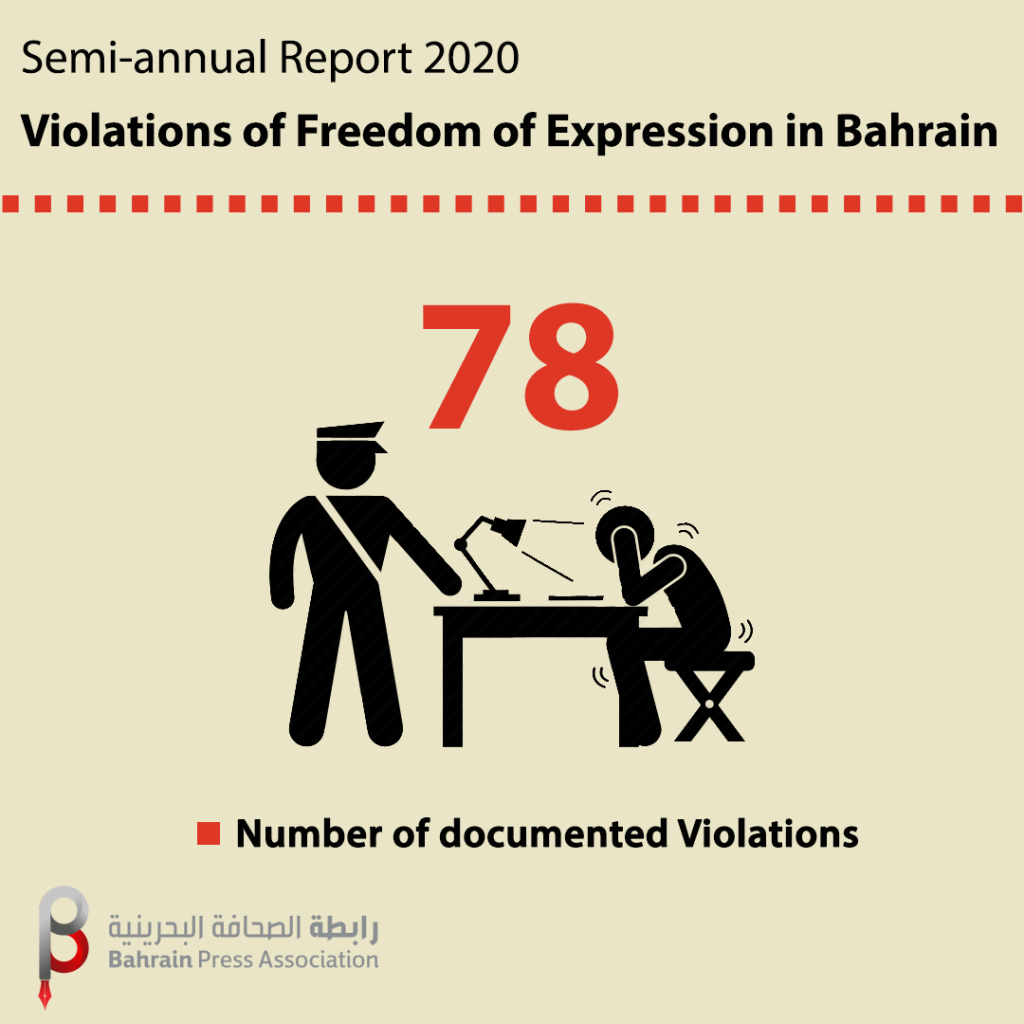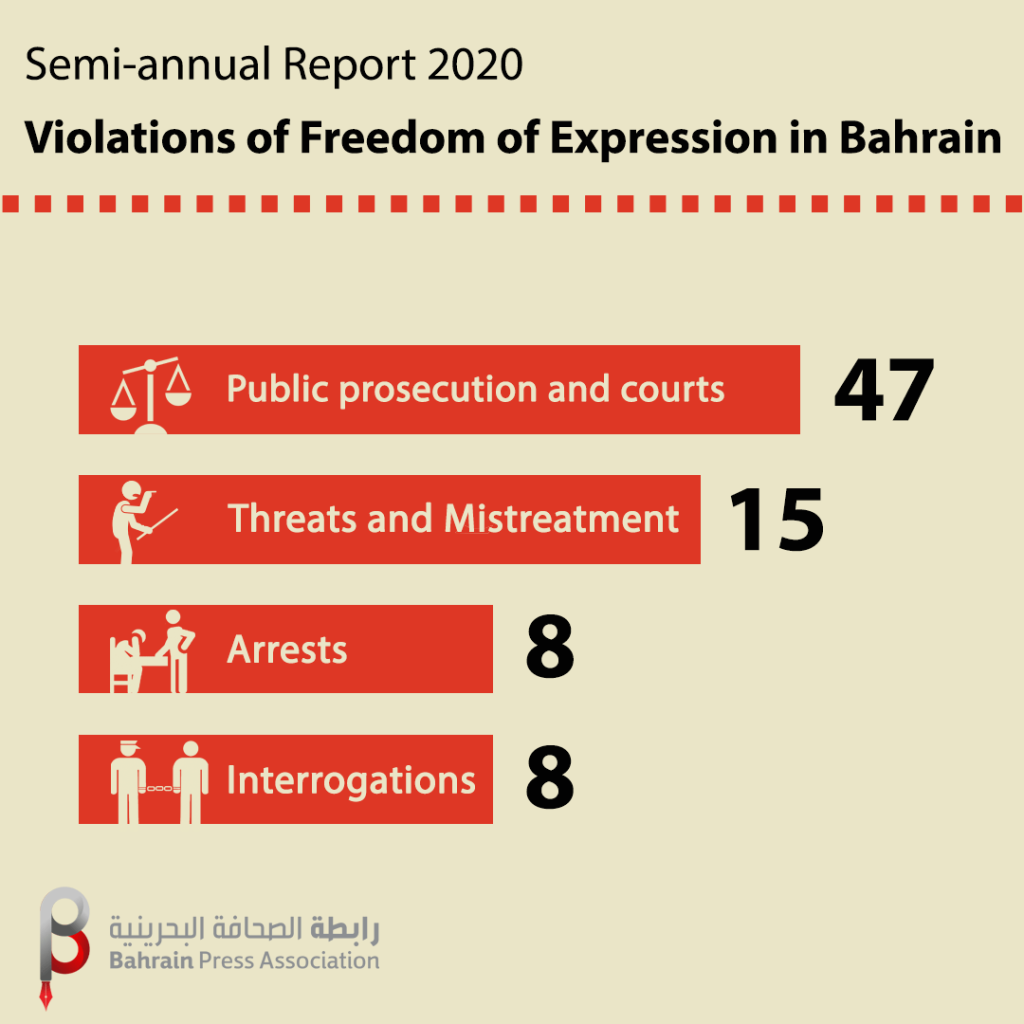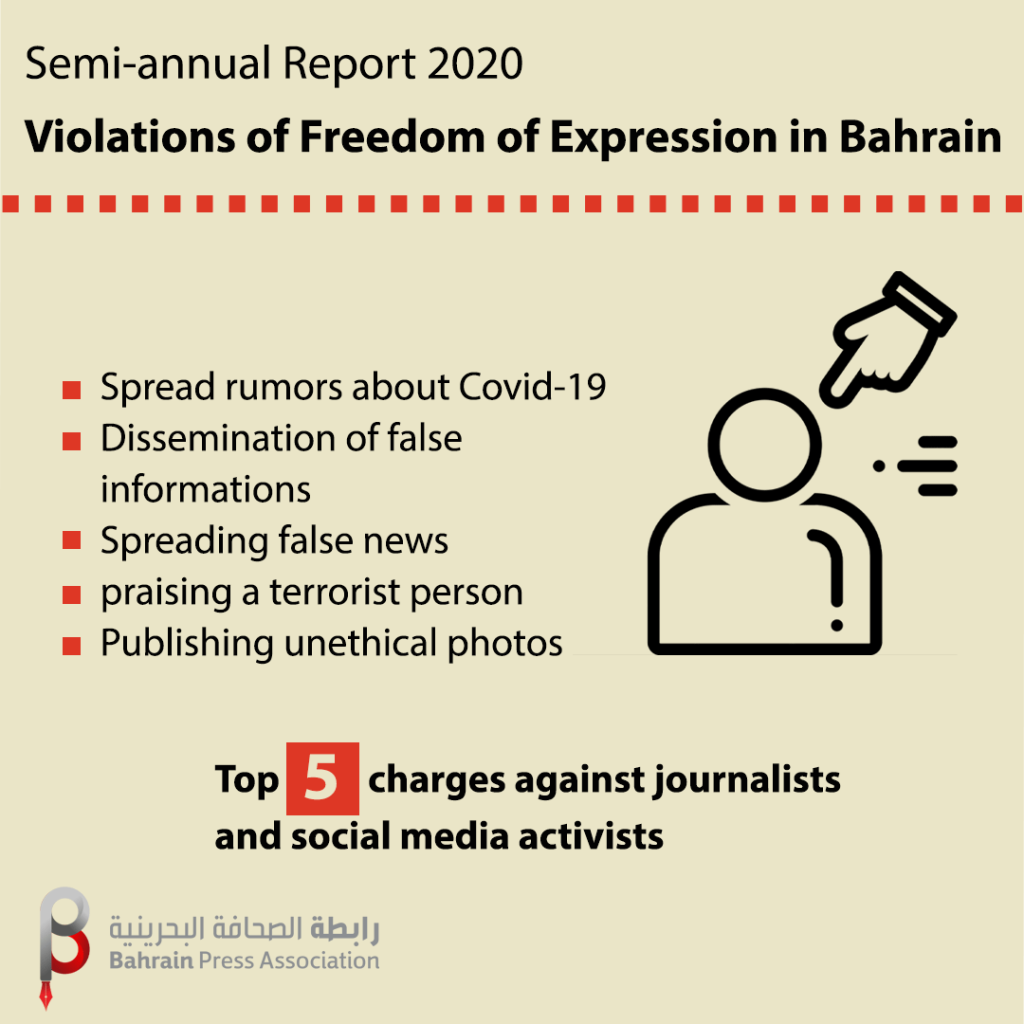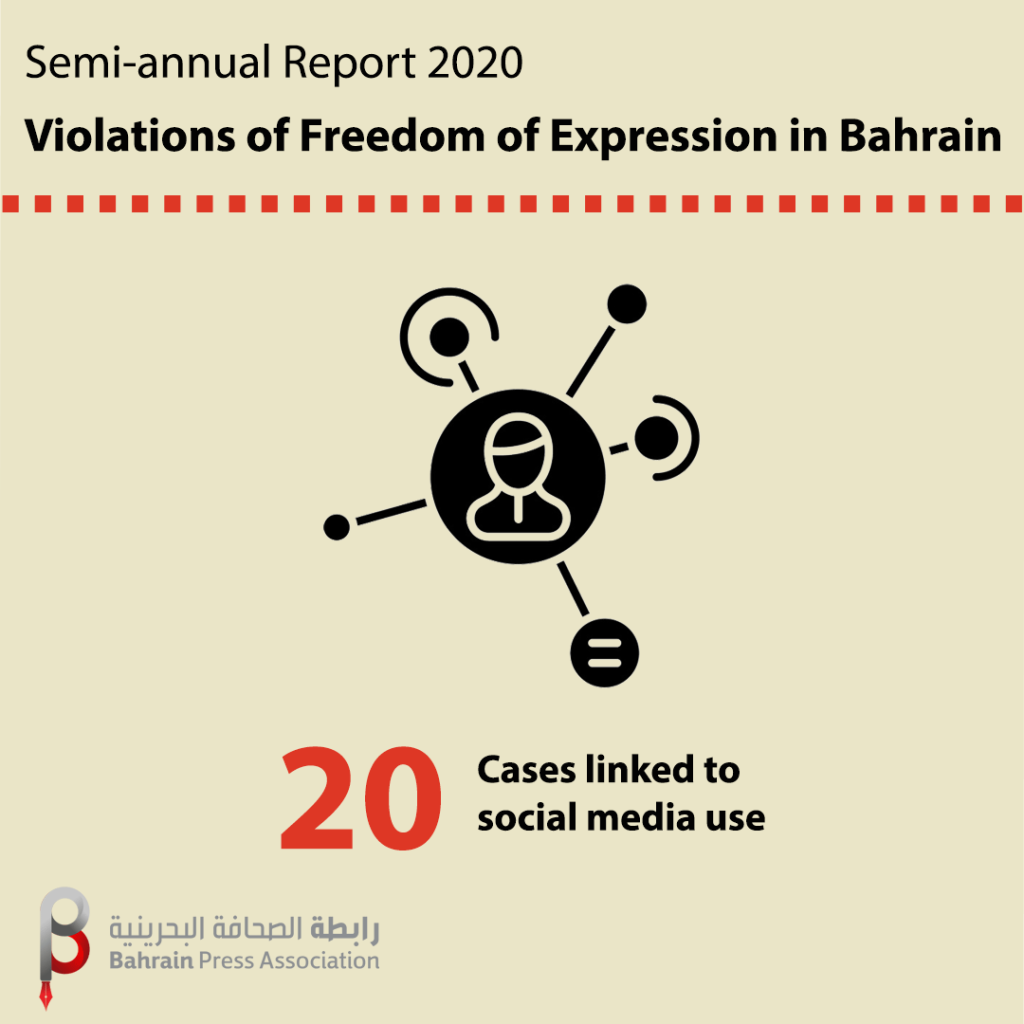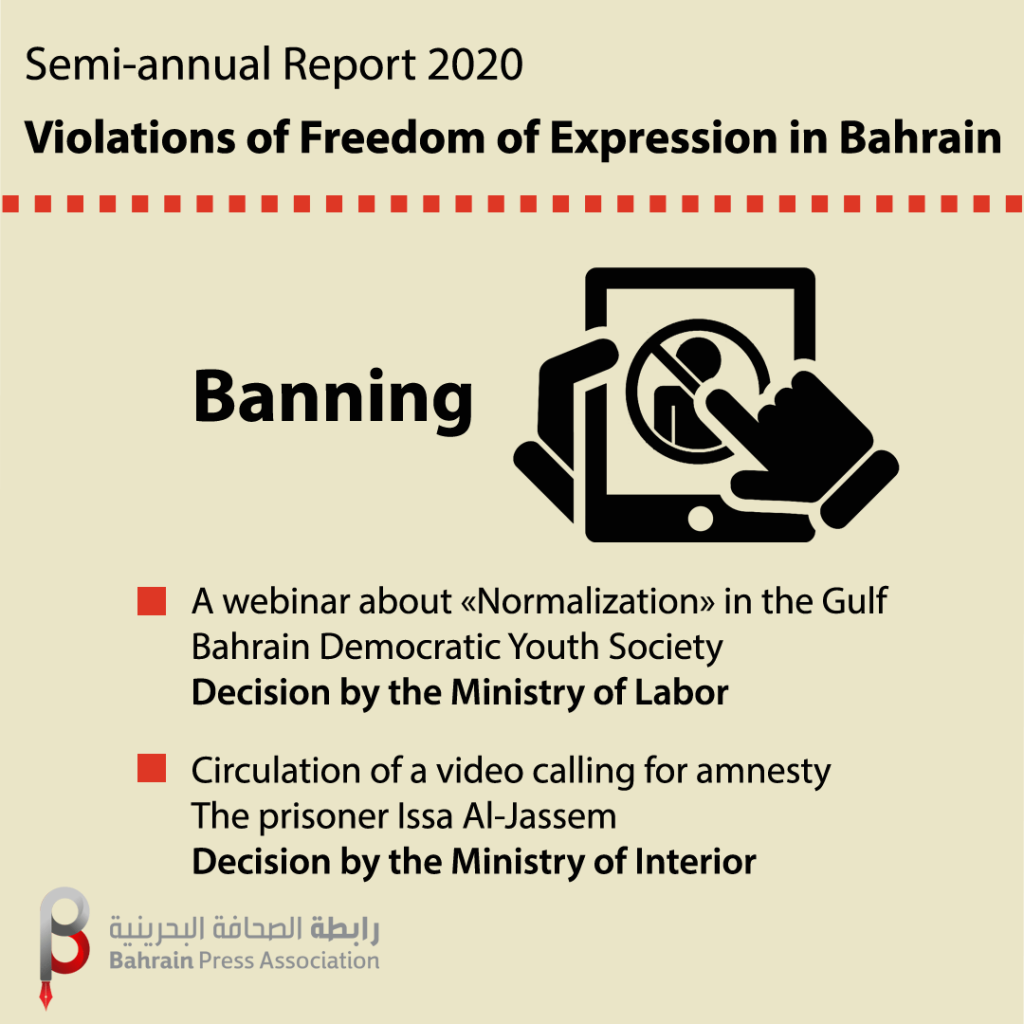Bahrain Press Association (BPA) – The Semi-annual report 2020
Bahrain: The ‘crimes’ of expression 78 violations, 8 interrogations, 8 arrests and 47 referrals to the prosecution and courts
Bahrain Press Association (BPA), London, 26 July 2020: The Bahrain Press Association (BPA) has documented 78 violations of freedom of expression and the press in Bahrain during the first half of 2020. This brings the number of violations since the beginning of the political crisis in the country at the beginning of 2011 to about 1637 violations.
The recorded cases from January to June 2020 were as follows: 47 cases were brought before the courts or transferred to the Public Prosecution; 8 cases of detention; 8 summons for interrogation; and 15 cases varied between dismissal and termination of employment as well as detention in solitary confinement.
Following the two incidents of the killing of Iranian General Qassem Soleimani in an American bombing at the beginning of the year, and the Coronavirus pandemic, the Ministry of Interior’s Cybercrime Unit imposed more punitive measures and legal prosecution against the freedom of expression and press freedoms in the cyberspace. The authorities used the two incidents as pretexts for its continuing persecution of journalists and Tweeters. They were arrested and summoned for interrogation for allegedly writing about regional events and negatively affecting the government’s efforts in managing the Corona pandemic file.
The Anti-cybercrime Law 60 of 2014, according to which the Cybercrime Unit operates and regulates its work, does not stipulate anything related to monitoring cyber activity pertaining to expression or other political content. Only trading, transmitting, disseminating, or publishing pornographic content—especially that is directed at children—is the area of the Unit’s operation. This is the only case stated under “content-related crimes” (Article 10). Otherwise, there is no indication in the aforementioned law that grants the Unit any authority over opinion, not to mention surveillance. Even with regard to the six types of crimes that fall within its scope of work, no one refers to crimes of expression of opinion. However, it seemed that the Cybercrime Unit has been obsessed with cyber activists over the past two and half years. There are only 3 cases documented by the Bahrain Press Association during the first half of 2020 related to publishing pornographic content or committing immoral acts on social media. All other cases are about taking independent positions that criticize the performance of ministries and government services.
The Bahraini Press Association regrets the deterioration of the press freedom and freedom of expression in general in Bahrain. Indeed, such status has become apparent, leading Bahrain to fall behind in all international indicators related to freedom of the press. The Press Association calls on the Bahraini government to take a bold decision to stop the Cybercrime Unit from reaching its grip to public discussions and correcting its path by limiting its penetration into the public sphere—repositioning it to the primary function for which it has been created.
The Association also cautions that the acute engagement of the security apparatus with the space of freedom of speech is tightening the screws on citizens, political activists, human rights advocates and journalists. The Association also brings to attention that the Bahraini government is evading its constitutional obligations, including relevant international covenants and treaties. The Association re-emphasizes the need to initiate a national dialogue to address the fate of freedom of expression and press freedoms in the country.
Investigation and Interrogation
The Ministry of Interior (3 January 2020) summoned journalist Aqil Swar; Youssef Al-Khagah, a leader in the dissolved WAAD association; and cyber activist Nader Abdel-Imam for Tweeting about the American military operation that targeted the Iranian general Qassem Soleimani.
At 1:00 am (6 January 2020), the Cybercrime Unit summoned Tweeter Khalil Edrabooh for posting a Quranic verse on his Instagram account commenting on the US military operation. The Public Prosecution summoned (24 March 2020) activist Reda Ali for interrogation about a social media campaign that he launched to demand the return of Bahrainis stranded in the Iranian city of Mashhad after suspending flights and closing airports due to the spread of the Coronavirus. The Ministry of Interior (7 April 2020) summoned the well-known Bahraini singer Hind, accusing her of “publishing false information about the conditions of home delivery workers.” Security authorities summoned (27 April 2020) photojournalist Mazen Mahdi for interrogation about tweets he posted regarding the Saudi position on the Palestinian cause. The Public Prosecution (1 June 2020) summoned the renowned lawyer Fatima Al-Hawaj for interrogation about a social media post that it deemed “glorifying Qasim Soleimani.”
Arrests
The Ministry of Interior (15 March 2020) announced the arrest of an anonymous person on charges of “promoting the rumor of imposing national safety procedures and urging people to quickly purchase their food needs due to the development of the Coronavirus crisis.” Security authorities arrested (30 January 2020) the historian Jassim Al Abbas, author of the “Years of al-Jareesh” blog, on charges of posting false information on social media.
They also arrested (5 May 2020) a foreign woman for what the authorities described as “”incitement to engage in acts of immoral behavior by posting immoral images on social media.” The Cybercrime Unit announced (6 May 2020) the arrest of an Asian man who “misused social media by posting a video containing money in his car.”
The Criminal Investigation Police (25 May 2020) arrested two persons (both 33 years old and of Asian nationality) after they had published a video clip that included what the police considered “a violation of public morals.” Security authorities arrested (28 May 2020) lawyer Rashed Al Binali and accused him of “spreading false news through his social media account about the Corona pandemic (Covid-19) saying that the virus is just a lie and does not exist in reality.” The Ministry of Interior arrested (19 June 2020) two Asians on charges of posting a video clip that contained what the Ministry called “money manipulation.”
Prosecution and Courts
A primary court (9 January 2020) sentenced the blogger and former candidate, Abdullah Al-Sahli, to one-month imprisonment for a social media broadcast criticizing the head of the Civil Service Bureau.
The appeals court (30 January 2020) replaced the one-year sentence and fine against the psychiatrist Dr. Sharifa Swar (in the lawsuit of Hamad Girls Preparatory School) with an alternative sentence for the same period. The Ministry of Interior (16 March 2020) referred 41 lawsuits against citizens (whose identity was not disclosed) to the public prosecution for allegedly disseminating rumors about the Coronavirus.
The Cybercrime Unit (11 April 2020) announced that legal (unknown) measures were taken against a Bahraini citizen aged 39. He reposted an old video clip on his social media account relating to the incident of damage and an assault on the sanctity of mosques months ago. The First Minor Criminal Court (27 April 2020) sentenced an Asian resident to 6 months imprisonment and deportation from the country on charges of publicly offending a religious sect.
Threats and Other Violations
The Ministry of Interior (3 January 2020) vowed to take “legal measures against everyone who uses social media accounts to violate public order, stir up discord, threaten civil peace and social fabric, and undermine security and stability in Bahrain.”
Al-Watan newspaper (26 January 2020) informed 12 of its staff members of their “dismissal” due to the operating conditions that required its restructuring. Journalist Nasser Zein (13 February 2020) lost his job in ‘Layalina’ magazine after its closure. That also resulted in his loss of all financial dues (8 years) after the administrative staff (all of Arab nationalities) had left the country.
Information from the central ‘Jaw Prison’ (9 April 2020) confirmed that detained journalist Mahmoud Al-Jaziri was subjected to punishment by transferring him to solitary confinement following the spread of a leaked audio clip in which he refuted the allegations of the National Institution for Human Rights about the prison’s readiness to prevent COVID-19. The Ministry of the Interior (24 April 2020) warned against the publication and circulation of a leaked audio message by prisoner Issa al-Jasim, demanding the release of prisoners to prevent the spread of COVID-19 in the prison.
The Ministry of Labour and Social Development (9 May 2020) banned an online symposium on anti-normalization with Israel that was scheduled for online streaming.
